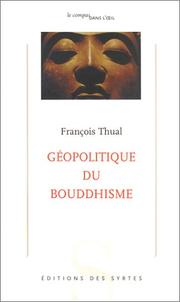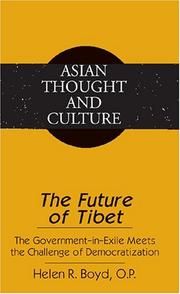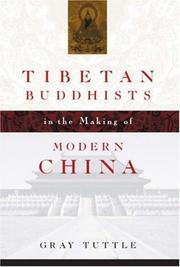| Listing 1 - 10 of 11 | << page >> |
Sort by
|
Book
ISBN: 9780415462662 Year: 2014 Publisher: Abigdon : Routledge,
Abstract | Keywords | Export | Availability | Bookmark
 Loading...
Loading...Choose an application
- Reference Manager
- EndNote
- RefWorks (Direct export to RefWorks)
Nationalisme --- Constitutionnalisme --- Bouddhisme et politique --- Nationalisme --- Politique et gouvernement --- Aspect religieux --- Bouddhisme.
Book
ISBN: 2701135257 9782701135250 Year: 2004 Publisher: Paris : Paris : Belin; Documentation française,
Abstract | Keywords | Export | Availability | Bookmark
 Loading...
Loading...Choose an application
- Reference Manager
- EndNote
- RefWorks (Direct export to RefWorks)
Burma --- Birmanie --- Politics and government --- Politique et gouvernement --- Bouddhisme et politique --- Civilisation --- Conditions économiques --- Relations interethniques --- Bouddhisme et politique - Birmanie --- Acqui 2006 --- Birmanie - Civilisation --- Birmanie - Politique et gouvernement - 1988 --- -Birmanie - Conditions économiques - 1948 --- -Birmanie - Relations interethniques
Book
Year: 2014 Publisher: Paris : Klincksieck,
Abstract | Keywords | Export | Availability | Bookmark
 Loading...
Loading...Choose an application
- Reference Manager
- EndNote
- RefWorks (Direct export to RefWorks)
En suivant les grands textes sacrés du bouddhisme, propose une réflexion philosophique qui permet de comprendre les notions de rhétorique (la persuasion, le pouvoir, le souveraineté...) à travers l'enseignement du Bouddha, et pose en même temps une question fondatrice de l'éthique rhétorique grecque : comment vivre humainement ?
Impermanence (Buddhism). --- Buddhism and politics. --- Rhetoric --- Impermanence (Bouddhisme) --- Bouddhisme et politique --- Rhétorique --- Religious aspects --- Buddhism. --- Aspect religieux --- Bouddhisme

ISBN: 2845450486 Year: 2002 Publisher: Paris : Syrtes,
Abstract | Keywords | Export | Availability | Bookmark
 Loading...
Loading...Choose an application
- Reference Manager
- EndNote
- RefWorks (Direct export to RefWorks)
Buddhism and politics --- Geopolitics --- Bouddhisme et politique --- Géopolitique --- Asie --- Asia --- Asie --- Politique et gouvernement --- Politics and government --- Politique et gouvernement --- Buddhism --- Geopolitics

ISBN: 0820457272 Year: 2004 Volume: 55 Publisher: New York : Peter Lang,
Abstract | Keywords | Export | Availability | Bookmark
 Loading...
Loading...Choose an application
- Reference Manager
- EndNote
- RefWorks (Direct export to RefWorks)
Book
ISBN: 9784784515189 Year: 2014 Publisher: Tōkyō : Shakai Hyōronsha,
Abstract | Keywords | Export | Availability | Bookmark
 Loading...
Loading...Choose an application
- Reference Manager
- EndNote
- RefWorks (Direct export to RefWorks)
Bouddhisme et politique --- Bouddhisme et politique --- Buddhism and politics --- Buddhism and politics --- Buddhism and politics. --- Buddhism --- Buddhism. --- Bukkyō-Fukyō-Rekishi. --- Guerre --- Interfaith relations. --- Nitchū sensō. --- Religion and politics --- Religion and politics. --- Religion et politique --- Sensō to shūkyō. --- Shinto --- Shinto. --- Shūkyō to seiji. --- Taiheiyō sensō. --- War --- War --- Histoire --- Histoire --- History --- History --- Relations --- Shinto. --- Aspect religieux. --- History --- Histoire --- Relations --- Buddhism. --- Religious aspects. --- Religious aspects. --- 1900-1999. --- China. --- Japan.

ISBN: 0231134460 Year: 2005 Publisher: New York Columbia University Press
Abstract | Keywords | Export | Availability | Bookmark
 Loading...
Loading...Choose an application
- Reference Manager
- EndNote
- RefWorks (Direct export to RefWorks)
Buddhism and politics --- Bouddhisme et politique --- Tibet Autonomous Region (China) --- Région autonome du Tibet (Chine) --- History --- Histoire --- S24/0500 --- S24/0915 --- Tibet--History (incl. Relations with China and England) --- Tibet--Tibetan Buddhism: history --- Buddhism --- Political aspects. --- Politic aspects. --- Tibet (China) --- Région autonome du Tibet (Chine) --- China --- Political aspects --- 1951 --- -Buddhism --- -Buddhism and politics --- Buddha and Buddhism --- Lamaism --- Ris-med (Lamaism) --- Religions
Book
ISBN: 9780199358151 Year: 2017 Publisher: New York Oxford University Press
Abstract | Keywords | Export | Availability | Bookmark
 Loading...
Loading...Choose an application
- Reference Manager
- EndNote
- RefWorks (Direct export to RefWorks)
The Buddha Party tells the story of how the People's Republic of China employs propaganda to define Tibetan Buddhist belief and sway opinion within the country and abroad. The narrative they create is at odds with historical facts and deliberately misleading, but, John Powers argues, it is widely believed by Han Chinese. Most of China's leaders appear to deeply believe the official line regarding Tibet, which resonates with Han notions of themselves as China's most advanced nationality and as a benevolent race that liberates and culturally uplifts minority peoples. This in turn profoundly affects how the leadership interacts with their counterparts in other countries. Powers's study focuses in particular on the government's "patriotic education" campaign-an initiative that forces monks and nuns to participate in propaganda sessions and repeat official dogma. Powers contextualizes this within a larger campaign to transform China's religions into "patriotic" systems that endorse Communist Party policies. This book offers a powerful, comprehensive examination of this ongoing phenomenon, how it works and how Tibetans resist it.
Buddhism --- Buddhists --- Buddhism and state --- Buddhism and politics --- Bouddhisme --- Bouddhistes --- Bouddhisme et Etat --- Bouddhisme et politique --- History --- Persecutions --- Histoire --- Persécutions --- Tibet Autonomous Region (China) --- China --- Région autonome du Tibet (Chine) --- Chine --- Relations --- S06/0439 --- S11/1215 --- China: Politics and government--Policy towards religion --- China: Social sciences--Works on national minorities and special groups: since 1949 --- S24/0910 --- Tibet--Tibetan Buddhism: general
Book
ISBN: 9782846702294 2846702292 Year: 2008 Publisher: Paris Le Cavalier Bleu
Abstract | Keywords | Export | Availability | Bookmark
 Loading...
Loading...Choose an application
- Reference Manager
- EndNote
- RefWorks (Direct export to RefWorks)
Le bouddhisme passe généralement pour une religion tolérante. Les figures médiatiques du Dalaï-lama et du moine vietnamien Thich Nath Hanh, évoquent dans les esprits une doctrine pacifique, qui a fait de la compassion son idéal. Il est vrai que le bouddhisme passe pour l'enfant sage de la famille des grandes religions. Chez lui, point de croisades ou de guerres saintes. Pourtant, des moines de Shaolin aux Tigres tamouls, les contre-exemples ne manquent pas. Et, précisément parce que les bouddhistes ont fait de la non-violence leur marque déposée, le rapport compliqué (et parfois ambigu) de cette religion à la violence pose question. Loin du bouddhisme véhiculé par le dogme de la compassion bien-pensante, Bernard Faure livre dans cet ouvrage une fine analyse d'une tradition vivante, faite de contradictions et d'ambiguïtés.
Violence --- Nonviolence --- Buddhism and politics --- Non-violence --- Bouddhisme et politique --- Religious aspects --- Buddhism --- Aspect religieux --- Bouddhisme --- Peace --- Buddhism. --- Buddhism and politics. --- S37/0600 --- S37/0610 --- Political science --- Politics and Buddhism --- Religions --- Buddha and Buddhism --- Lamaism --- Ris-med (Lamaism) --- Prayers for peace --- Peace (Theology) --- Religion and peace --- Social psychology --- Violent behavior --- Religious aspects. --- Political aspects --- Buddhism outside China, Tibet, Mongolia and Japan--Buddhist philosophy, thought and psychology --- Buddhism outside China, Tibet, Mongolia and Japan--Buddhist ethics --- Religious aspects&delete&
Book
ISBN: 9782747573856 2747573850 Year: 2004 Volume: 5 Publisher: Paris Harmattan
Abstract | Keywords | Export | Availability | Bookmark
 Loading...
Loading...Choose an application
- Reference Manager
- EndNote
- RefWorks (Direct export to RefWorks)
Buddhism and politics --- Bouddhisme et politique --- Shotoku, --- Japan --- Japon --- Civilization --- Buddhist influences --- Civilisation --- Influence bouddhique --- Princes --- Buddhism and state --- History --- Shōtoku Taishi, --- J1800.10 --- J1864 --- J4600.10 --- J2284.10 --- Japan: Religion -- Buddhism -- history -- Kodai, prehistoric and ancient, premodern --- Japan: Religion -- Buddhism -- relation with state and politics --- Japan: Politics and law -- history -- earliest and premodern --- Japan: Genealogy and biography -- biographies -- earliest and premodern ( -645) --- Civilization --- Buddhist influences --- Lamaism and state --- State and Buddhism --- State, The --- Jōgū Taishi, --- 聖徳大子, --- 聖徳太子, --- 聖徳皇太子, --- 聖德太子, --- Buddhist influences. --- Shōtoku, --- Buddhist influences. --- Princes - Japan - Biography --- Buddhism and state - Japan - History --- Shōtoku Taishi, - 574?-622? --- Japan - History - Asuka period, 592-645 --- Shōtoku Taishi
| Listing 1 - 10 of 11 | << page >> |
Sort by
|

 Search
Search Feedback
Feedback About UniCat
About UniCat  Help
Help News
News